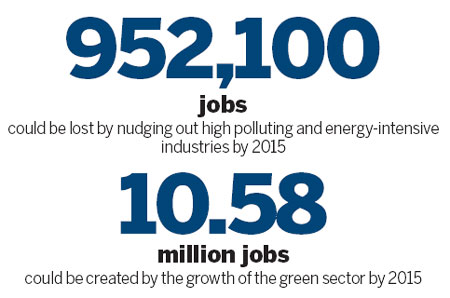Green industries to add millions of jobs
Updated: 2011-11-16 08:02
By Li Jing (China Daily)
|
|||||||||||

BEIJING - Greening China's heavily polluting and energy-consuming industries will cause short-term losses but bring huge economic and social benefits in the long run, says a leading environmental think tank.
The China Council of International Cooperation on Environment and Development suggested that between now and 2015 the country should spend an estimated 5.77 trillion yuan ($909 billion) to improve energy efficiency and protect the environment.
Nudging out high polluting and energy-intensive industries could cost the country 952,100 jobs and more than 100 billion yuan in economic output by 2015, according to the council's calculations based on its methodology, but in return the country could save 1.43 trillion yuan in its energy expense, said a report by the council.
In addition, the growth of the green sector could boost GDP growth by 8.08 trillion yuan while creating 10.58 million jobs.
The council, comprising 200 world experts who regularly offer environment-related policy suggestions to authorities, is currently holding its annual conference in Beijing.
"The industrial sector is still the prime energy consumer and a major cause of pollution, so greening the sector is key for China's green transformation," said Li Ganjie, vice-minister of environmental protection and also the secretary-general of the council.
But even with such large-scale investment, the country is still set to face ever-greater challenges of environmental pollution and resource depletion in the coming decade considering the current level of industrialization and urbanization, Li warned.
By 2020, the country may still be troubled by serious environmental woes such as worsening air pollution, a deepening water crisis, continuous degradation of ecological systems, and mounting hazardous wastes, says the report.
Moreover, China will be under increasing international pressure to control its greenhouse gas emissions.
"The environmental protection situation in China is still described as 'grave', and the critical period for change still lies ahead," said Margaret Biggs, the council's executive vice-chairwoman.
The report also urged that government at all levels get rid of the obsession with GDP growth, reduce interference in the market, and deepen tax and price reforms to encourage green development.
"The blind pursuit of economic growth has now become a huge obstacle for China's green growth ... The government should clamp down on local protectionism that crowds out green investment," says the report.
More precisely, local authorities should quit their current role of making full decisions for project investment - a reason that polluting enterprises backed by the governments sometimes ignore environmental regulations.
"Local governments should not protect polluting firms and outdated production capacities just because of the tax revenues they bring," the report says.
Instead, the government should strengthen its supervision in mining activities, pollution emissions, food security and safety management.
Introducing environmental protection taxes, including a carbon tax, and reforming the pricing mechanism of key resources should also be prioritized.
"For pricing of key resources, particularly electricity, oil and coal, (it is necessary to) get the government out of the business of interfering directly in the economy, and let the market decide and reflect their scarcity," said Daniel Dudek, chief economist with the US-based Environmental Defense Fund and a member of the council.








